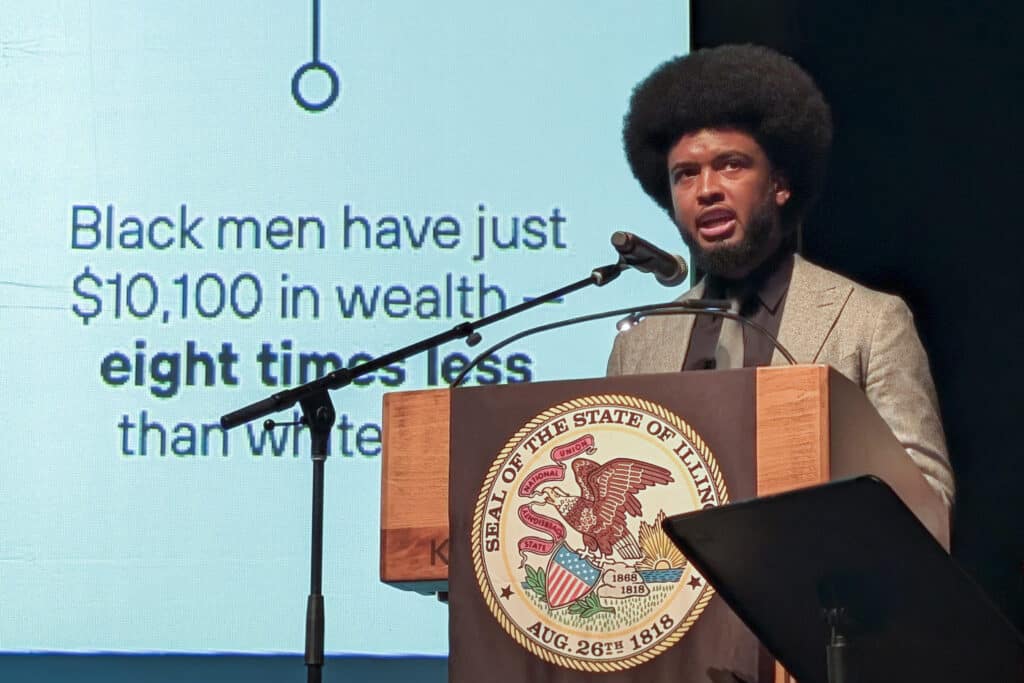### Reparations and Healing: A Community Call to Action in Illinois
On a vibrant Saturday morning in Urbana, community members united to engage in a public hearing that delved into the historical and ongoing injustices faced by Black Americans in Illinois. This gathering was not merely an event; it was a powerful call to action advocating for reparations. Hosted at the iconic Krannert Center, the hearing was orchestrated by the State of Illinois African Descent-Citizens Reparations Commission (ADCRC) in conjunction with the Champaign-Urbana Reparations Coalition (CURC).
### Voices of Change
The atmosphere was charged with passion as speakers highlighted the pressing need for reparative justice to aid in the healing process from centuries of systemic racism. Keynote speaker Sundiata Cha-Jua, an associate professor of African American studies at the University of Illinois Urbana-Champaign, emphasized the collective nature of reparations. “It’s not about individual reparations,” he stated. “We constitute a nationality, a nation of people that simply does not have a state.” His address, titled “Stolen Labor and Hindered Opportunity,” set the tone for the day by calling for reparations not only as individual payments but as a community endeavor.
### Addressing the Wealth Gap
As discussions unfolded, various speakers brought attention to crucial issues such as the African American wealth gap, the mental and physical toll of systemic neglect, and the persistent perception of Black families as outsiders within their own communities. These topics resonated deeply with attendees, prompting a dialogue about the pain and disparities that have gripped the community for generations.
### The ADCRC’s Mission
The ADCRC has been actively conducting public hearings across Illinois since 2021, aiming to investigate the state’s involvement in the slave trade and the subsequent disenfranchisement of African Americans. According to their official website, the commission strives to amplify underrepresented voices and experiences to shape future policies. “ADCRC is offering a platform to amplify voices that have gone unheard for too long,” remarked Marvin Slaughter Jr., the commission’s chairman, highlighting the importance of diverse perspectives in crafting solutions.
### A Holistic Perspective on Healing
Reverend Terrance Thomas further engaged the crowd with his poignant remarks on the medical and spiritual disregard faced by African Americans, particularly Black women. He drew a powerful analogy by stating, “Doctors are to Black women what police are to Black men.” This analogy served to illustrate the intricate web of systemic neglect that pervades various aspects of life for Black Americans.
### Community Participation
The public hearing encouraged a dynamic exchange, with audience members actively cheering and vocalizing their support for the ideas presented. During the public comment segment, attendees shared their thoughts and experiences, fostering a sense of community and collective reflection. This event was one of six public hearings planned by the ADCRC, each designed to gather insights and community feedback.
### Local Initiatives Inspired by Evanston
The CURC has made significant strides since its inception two years ago, drawing inspiration from Evanston, which became the first municipality in Illinois to implement a reparations fund for individuals harmed by housing discrimination. Joyce Mast, a volunteer with CURC, articulated the belief that reparations are not just possible; they are a growing movement. “It is possible to have reparations because Evanston has it, and there are a couple of other places in the country as well,” she told attendees, emphasizing that Champaign-Urbana is part of a larger nationwide initiative.
### Future Steps Toward Repair
In addition to their grassroots efforts, CURC has proposed the establishment of an intergovernmental commission in Urbana, advocating for collaboration among the city, the Champaign County Board, and the University of Illinois. Volunteer Marcia Nelson emphasized their vision of cultivating a “culture of repair” in the community, one in which government entities and institutions actively participate in the reparative process.
### Conclusion: The Road Ahead
As the conversation around reparations continues to evolve, the community in Illinois is taking tangible steps toward acknowledging past wrongs and envisioning a future of healing and justice. The commitment to address systemic harm such as redlining and discrimination marks a significant shift in the dialogue surrounding reparations, positioning Champaign-Urbana as a crucial player in this ongoing movement.



